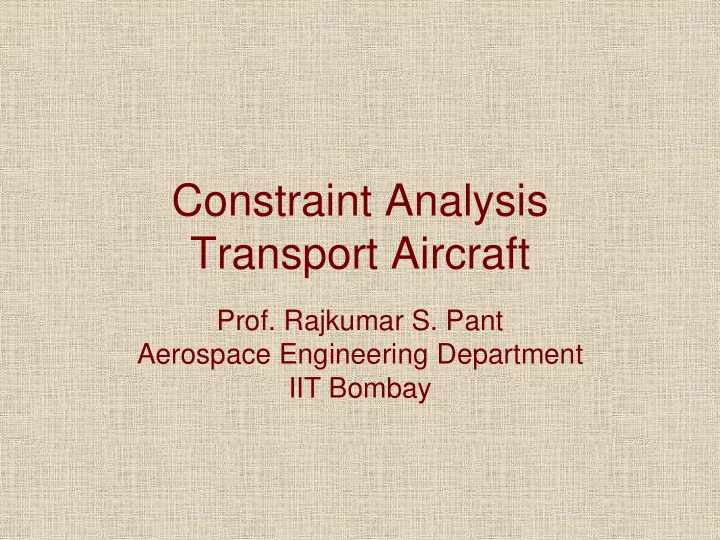

Constraint Analysis Transport Aircraft Prof. Rajkumar S. Pant Aerospace Engineering Department IIT Bombay
Phases in Aircraft Design o CONCEPTUAL ( Method ) – Establish concept feasibility – Identify the requirements that drive the design – Carry out initial sizing & layout – Estimate component masses, performance, and cost o PRELIMINARY ( Numbers ) – Freeze the configuration – Ensure design practicality – Develop mechanical & structural concepts – Develop test and analytical base o DETAIL ( Nuts & Bolts ) – Design various components – Develop tooling and fabrication process – Test major items – Finalize weight and performance estimates AE-332 Aircraft Design Capsule-5
Raymer’s Big Six Parameters Wing Related 1. t/c Thickness Ratio 2. λ Taper Ratio 3. Λ Sweep 4. AR Aspect Ratio Aircraft Related 5. W/S Wing Loading 6. T/W (or P/W) Thrust (Power) Loading AE-332 Aircraft Design Capsule-5
Importance of W/S and T/W Appear in many performance equations W/S and T/W W/S alone o Take-off Distance o Stalling speed o Sustained Turn rate o Landing Distance o Range and Endurance o Ceiling o Climb performance o Instantaneous Turn T/W alone o Climb Gradient o Missed Approach Gradient AE-332 Aircraft Design Capsule-5
Takeoff & Landing Climb Gradients A brief explanation AE-332 Aircraft Design Capsule-5
A Closer Look at Take Off AE-332 Aircraft Design Capsule-5
The Four Climb Segments First Segment: From the end of the takeoff distance to the point the landing gear is fully retracted. (Speed = V 2 ) Second Segment: The point where the landing gear is retracted to an altitude of at least 400’ (obstacle dependent). (Speed = V 2 ) Third (Transition) Segment: The horizontal distance required to accelerate at a constant altitude to facilitate flap/slat retraction and acceleration to final climb speed. Final Segment: End of third segment to at least 1500’ (obstacle dependent) with flaps/slats retracted, max. continuous power, and final climb speed . AE-332 Aircraft Design Capsule-5
Typical Takeoff Segments No. of Engines 4 3 2 Required Gradient (%) 1 st Seg 0.5 0.3 0.0 2 nd Seg 3.0 2.7 2.4 3 rd Seg 1.7 1.5 1.2 Enroute 1.6 1.4 1.1 Courtesy: Jet Airways AE-332 Aircraft Design Capsule-5
Recommend
More recommend